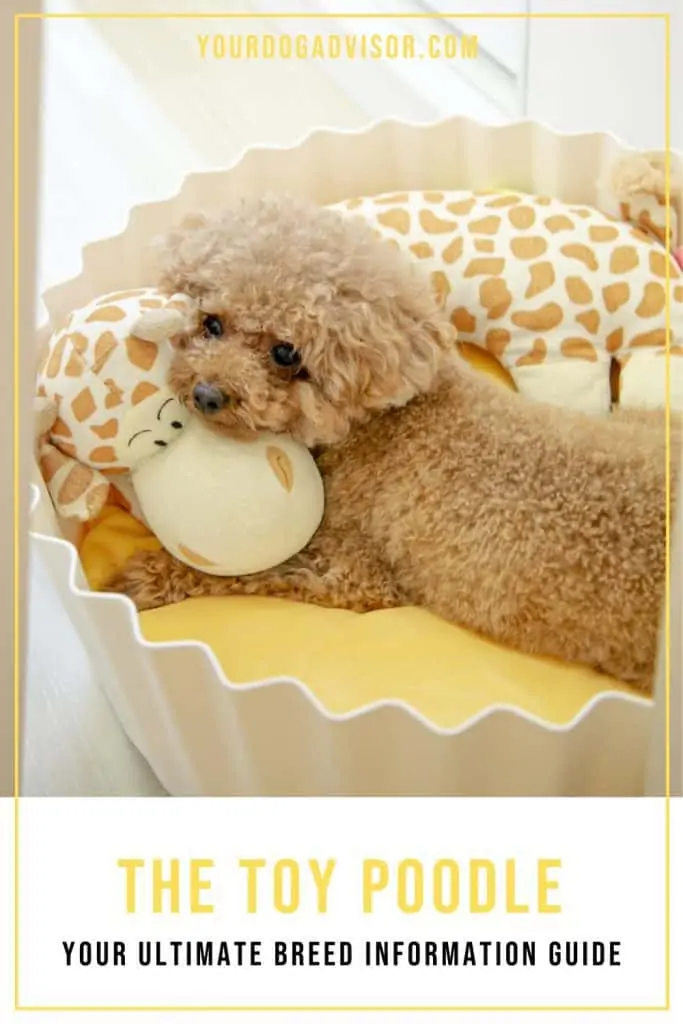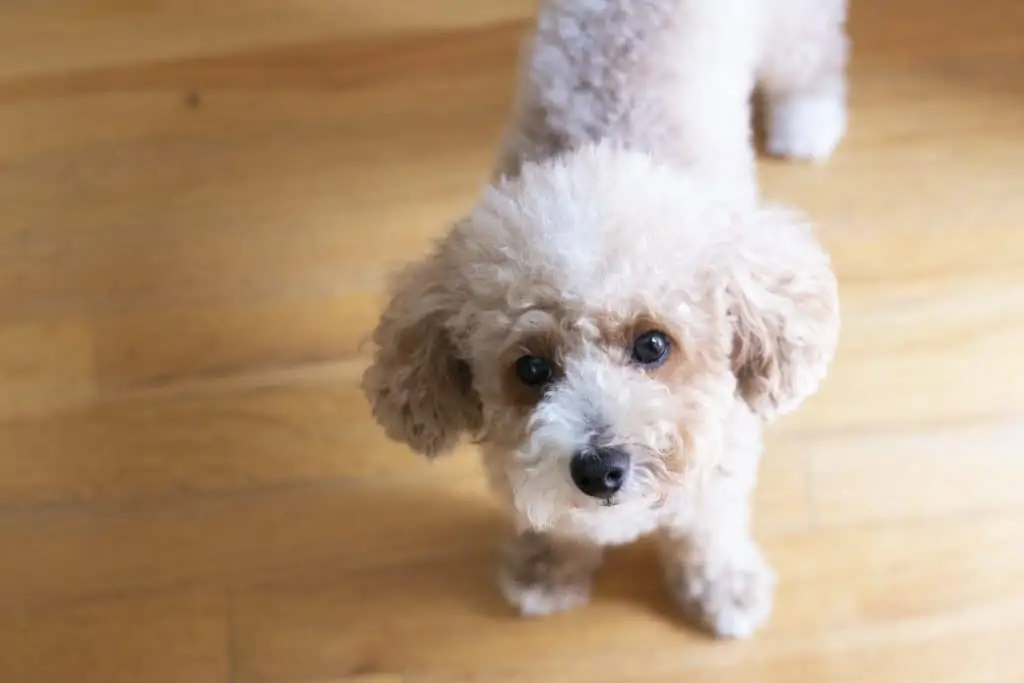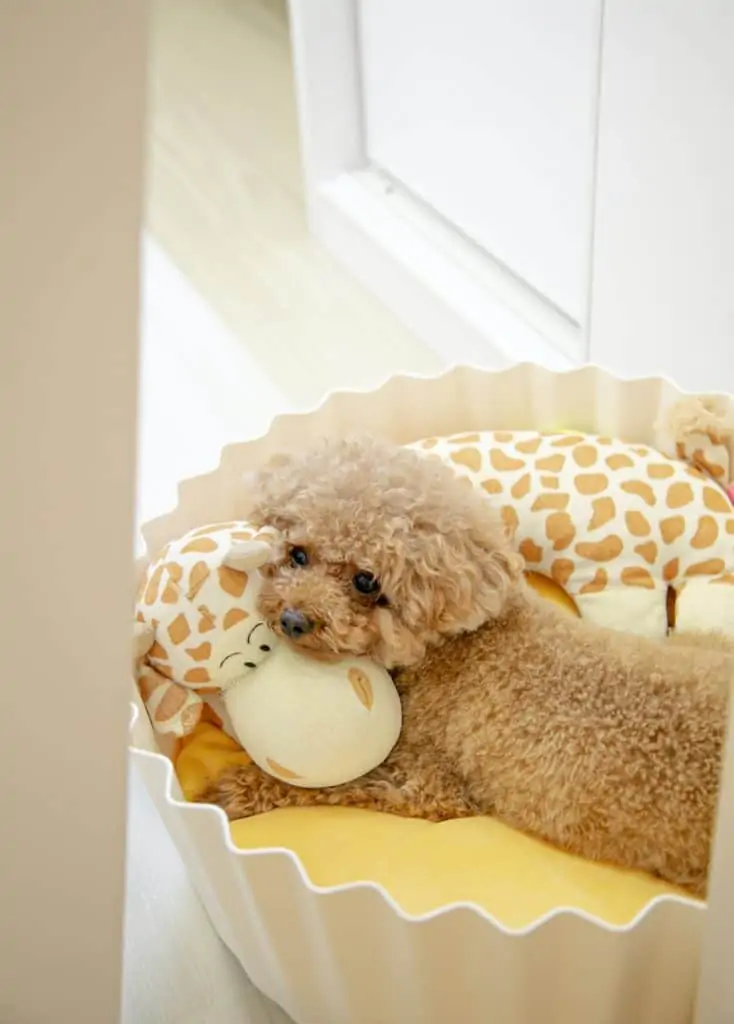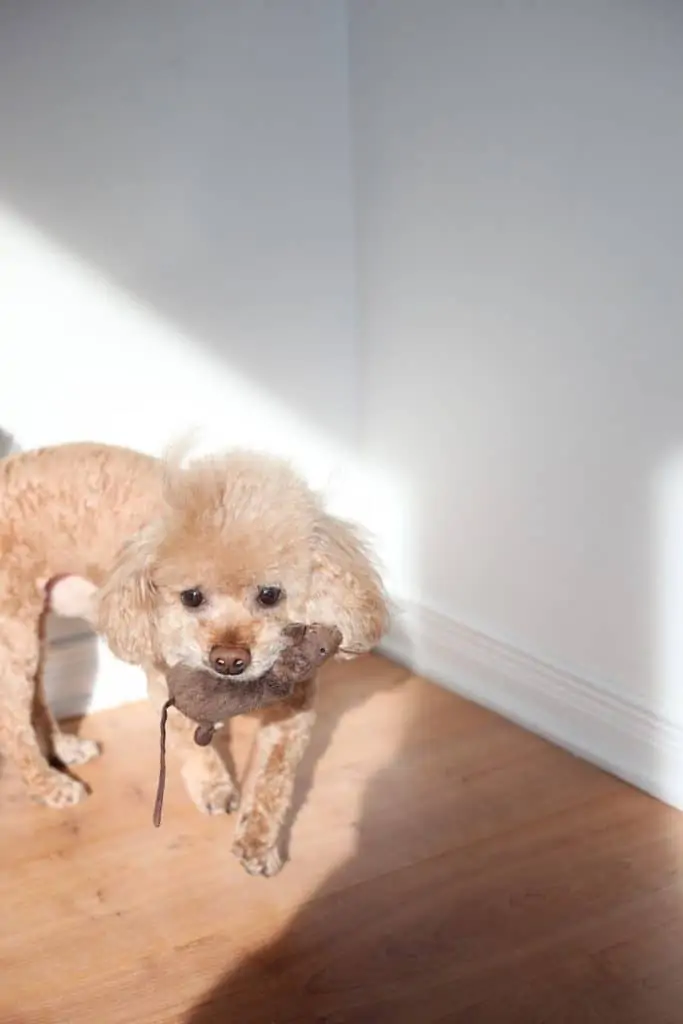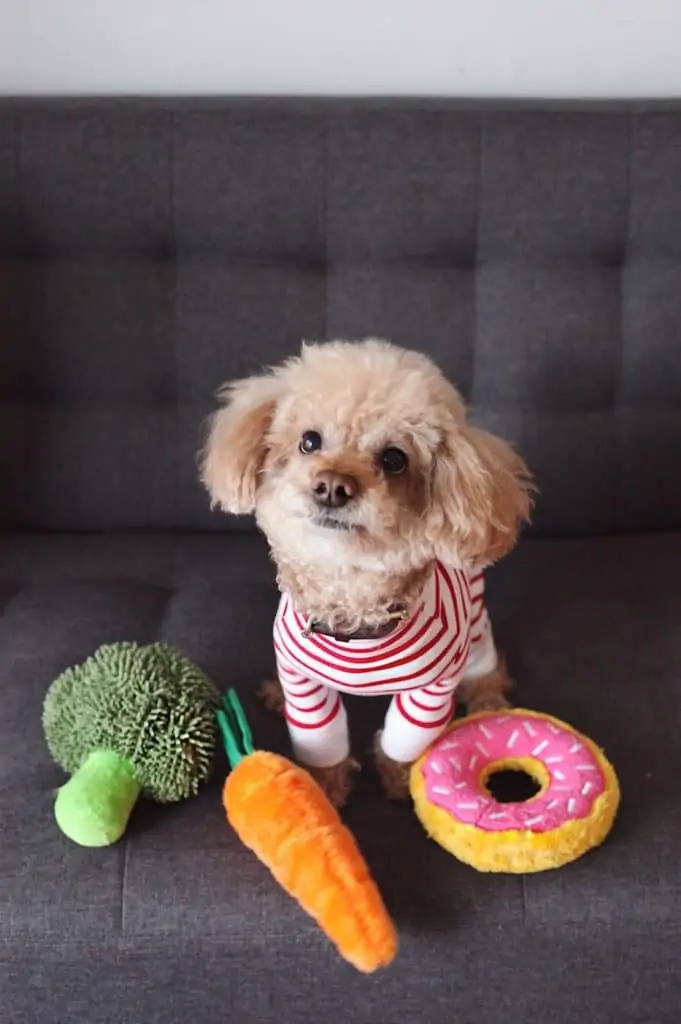If you love intelligent, hypoallergenic dogs then you’re going to fall head over heels for the Toy Poodle. Compact, clever, and adorably affectionate, the Toy Poodle is the ideal companion for those living in apartments, though he is truly adaptable to living in all kinds of homes and spaces.
But what exactly is the Toy Poodle, how much do puppies go for, and what should you know about the Toy Poodle before investing in one?
Keep reading to find out.
Contents
What Is A Toy Poodle?
The Toy Poodle is a size variety of the purebred Poodle.
The Toy Poodle is a size variety of the purebred Poodle breed. He is incredibly popular throughout the United States, coming in at number 7 out of 197 on the American Kennel Club’s list of America’s Most Popular Dog Breeds.
Of course, the Poodle in general is a popular breed thanks to his intelligence and high level of trainability. Poodle dogs come in three common size varieties including Standard, Miniature and Toy.
The Toy Poodle is the smallest size variety. And while the Toy Poodle is the same breed as the Standard Poodle and Miniature Poodle, he can be prone to some different health issues and overall care needs.
With that in mind, let’s take a look at a brief overview of this tiny dog.
Height: 10 Inches or Under
Weight: Between 4 and 6 Pounds
Coat Type: Dense, Curly
Hypoallergenic: Yes
Coat Colors: Apricot, White, Black, Cream, Sable, Grey, Black and white, Brown, Silver, Blue, and Red.
Temperament: Athletic, Graceful, Proud, Intelligent, Affectionate
Health Issues: Addison’s Disease, Cushing’s Disease, Epilepsy, Legg-Calve-Perthes, Patellar Luxation, Sebaceous Adenitis, Von Willebrand’s Disease, Atrial Septal Defect, Chronic Active Hepatitis, Hypothyroidism, Hip Dysplasia, Dental Disease, Collapsed Trachea, and Optic Nerve Hypoplasia
Lifespan: 10 – 18 Years
Breed Clubs That Accept the Toy Poodle:
- The American Kennel Club
- The United Kennel Club
- Poodle Club Of America
Toy Poodle History and Origin
Poodles were versatile working dogs who started out as water retrieving dogs in Germany.
Though commonly referred to as “French Poodles”, the Poodle actually originated in Germany as a water retrieving dog. During this time, the Poodle’s fanciful haircut was actually designed for practicality in an effort to protect the dog while swimming in the frigid German waters.
Eventually, the Poodle found his way to France where, through generations, he made his mark performing a number of working tasks. Poodles are famous throughout history as entertaining circus dogs, street performers, and eventually companion dogs for noble women of France.
Their flamboyant haircut made them the ideal canine accessory, however nobels looking to travel and desiring a smaller lap or purse dog were truly responsible for the breed being bred down in size.
Eventually, the Poodle became available in three different size varieties, as we mentioned above.
However, despite their different sizes, all Poodles are generally the same. They are athletic, outgoing and highly intelligent.
Even small Poodles like the Toy Poodle, who is often no heavier than six pounds, is an active and outgoing dog who requires routine exercise, mental stimulation, and lots of affection.
Let’s learn more.
Toy Poodle Temperament and Personality
Toy Poodles are happy, intelligent companions who do well with children and other pets.
Toy Poodles are wonderful companion dogs. Their hypoallergenic coat makes them ideal for those with allergies and their petite size means they do well in a variety of home types. These active, outgoing and intelligent dogs are highly athletic, which can be surprising to some who think the Poodle is more of a prim and proper type of dog.
On the contrary, and in spite of the Poodle’s proud appearance, the Toy Poodle doesn’t mind getting dirty and playing hard. For this reason, this tiny dog can do wonderfully with active owners who spend a lot of time outdoors. On the flip side, the Toy Poodle is small enough to have his needs met indoors as well, meaning he is a great companion for older singles or retirees looking for a spirited cuddle companion.
However, while Toy Poodles are not aggressive and generally get along well with people and animals of all ages, they can easily be injured if handled too roughly.
Small children or playful dogs that are larger than your Toy Poodle have the potential to cause serious damage, so it’s best to monitor young children around your dog and to ensure they know how to properly and safely handle smaller pets.
With that mind, it’s a good idea not to leave your Toy Poodle unattended with more playful dogs who are larger or more rambunctious.
We should also note that Toy Poodles have a strong prey drive. Remember, they are bred working dogs who, despite their smaller size, are still Poodles who come from a hunting background.
This means that it’s important you teach your Toy Poodle a solid recall at an early age and implement good socialization and training to reduce potential behavior issues in the breed.
How To Properly Train and Socialize A Toy Poodle
It’s important to ensure your Toy Poodle is properly trained and socialized at an early age.
Like all dogs, the Toy Poodle can be prone to behavioral issues if not properly trained and socialized. These issues could include barking, digging, marking and other destructive behaviors caused by anxiety and stress.
To reduce potential behavioral issues in your Toy Poodle, it’s important to properly train and socialize them at an early age.
How To Train A Toy Poodle
Smaller dogs like the Toy Poodle can be notoriously difficult to housetrain. This generally has nothing to do with the dog’s intelligence and more to do with the fact that smaller dogs make smaller potty stains, so it’s more difficult for owners to detect when their dog has had an accident.
When working on potty training your Toy Poodle, it’s best to start out by keeping him in a confined area. Invest in a puppy play pen or a baby gate to keep track of your Toy Poodle and any accidents he may have, and make sure you take him outside multiple times a day.
Go to the same place in your yard and tell him to “go potty” or use another repetitive cue word. Toy Poodles are also great candidates for potty pads, which is wonderful for those living in apartments.
Humane Pet Washable Potty Pads
No products found.
Potty pads come in several varieties, with many being disposable. However, if you choose to house train your Toy Poodle on a potty pad for the duration of his life, you might want to consider investing in washable potty pads.
Doing so will not only save you money in the long run, but it is also friendlier for the environment.
The above washable potty pads come with layered protection to reduce leaking and odors. They also include non-slip grips to keep them in place on your floor, and they are machine washable. You can order the pads in different colors or sizes, depending on your needs.
Along with working on potty training with your Toy Poodle, you should also work to teach your Poodle cues and a solid recall. Remember, the Toy Poodle has a high prey drive, so teaching him a good recall should be done right away.
Toy Poodles are very intelligent and eager to please, so training them is a pleasant experience. Try and refrain from punishing your Toy Poodle, as they respond best to positive reinforcement training techniques like treats and praise.
How To Socialize A Toy Poodle
Socialization is just as important as training to ensure your Toy Poodle grows up happy, healthy and well-rounded.
To properly socialize your Toy Poodle, be sure to bring him with you on as many outings as possible during puppyhood. Introduce him to different sights, sounds, people, places and experiences and try and ensure these first impressions are positive for him.
Avoid forcing your Toy Poodle into situations that are clearly frightening for him, as doing so can exasperate his fears and lead to behavioral issues in the future.
If you are raising your Toy Poodle in the home with children, we suggest working with youngsters and teaching them basic canine body language. Monitor very young children around your Toy Poodle to ensure they aren’t playing too roughly, as Toy Poodles can be easily injured, as we mentioned above.
Toy Poodle Health and Life Span – What You Should Know
Like all dogs, Toy Poodles can be prone to suffering from certain health issues.
One of the great things about Toy Poodles, aside from their incredible temperaments and high trainability, is that they are relatively healthy and long-lived.
In fact, Toy Poodles are some of the longest lived dogs in the canine kingdom, with a lifespan ranging from 15 to 18 years. However, like all dogs, Toy Poodles can be prone to some genetic health issues that owners should be aware of.
These issues include:
- Addison’s Disease
- Cushing’s Disease
- Epilepsy, Legg-Calve-Perthes
- Patellar Luxation, Sebaceous Adenitis
- Von Willebrand’s Disease
- Atrial Septal Defect
- Chronic Active Hepatitis
- Hypothyroidism
- Hip Dysplasia
- Dental Disease
- Collapsed Trachea
- And Optic Nerve Hypoplasia
What You Should Know About Collapse Trachea In A Toy Poodle
All of the above issues can be serious in a Toy Poodle and can be exasperated if you get your Toy Poodle from an irresponsible source. However, regardless of where you get your Toy Poodle, he can still be prone to suffering from collapsed trachea.
Collapsed trachea is common in very small dogs whose bones are small and more fragile. This condition can occur when pressure is put on your dog’s throat and neck, and can happen when you are holding your dog, pulling on your dog’s collar, or walking your Toy Poodle on a leash and collar alone.
Symptoms of collapsed trachea include a honking dry cough, exercise intolerance, difficulty breathing, wheezing, and coughing when walked, picked up or handled.
If you think your dog has suffered from tracheal collapse, schedule a veterinarian appointment as soon as possible. While there is no cure for collapsed trachea, there are treatments that can help alleviate the symptoms.
How Diet Helps Aid In Your Toy Poodle’s Health
While Toy Poodles are relatively healthy, you can help ensure they live their longest, happiest lives by offering them quality dog food. There are different types of dog foods available for Toy Poodles including dry food, wet food and raw dog food, but for smaller dogs we would recommend a combination of dry dog food and wet or raw dog food.
Smaller dogs like the Toy Poodle can be more susceptible to dental disease, and chewing on hard kibbles can help reduce tartar and plaque buildup.
Regardless of which type of dog food you choose, be sure to avoid dog foods with additives, fillers, corn, soy, wheat or gluten, and stick with dog foods that include real meat protein.
Toy Poodles will also do best on a dog food that is specified for their age and activity level, and a dog food that is rich in fatty acids, carbohydrates, vitamins and minerals, and contains a good source of water.
Smaller dogs have a higher metabolism, so make sure you get dog food that is specified for small breed dogs in order to accommodate their unique dietary needs.
ORIJEN Dry Dog Food Small Breeds
No products found.
One of the dog foods we would recommend for the Toy Poodle is Orijen Dry Dog Food for Small breeds. This dog food is designed with a uniquely shaped kibble that makes eating and chewing much easier.
The kibble is also made with all the nutrients your Toy Poodle needs in order to thrive including real animal protein like turkey or fish, and it includes vitamins and minerals to increase immune support and eye health.
What Are The Grooming Requirements For A Toy Poodle?
Toy Poodles may require more grooming than some other breeds due to their curly coats.
Along with ensuring your Toy Poodle maintains a healthy diet, good grooming practices can also help keep your dog in ship shape.
Although Toy Poodles are hypoallergenic, their coats still require a good amount of grooming to keep them from developing mats, tangles and skin issues.
Pay special attention to your Toy Poodle’s ears, tail, and under his arms and legs. These areas are notorious for developing mats and tangles that can lead to painful skin issues.
If you are not planning on showing your dog, you might opt to keep his coat cut in a shorter puppy cut. This cut is much easier to maintain and only requires occasional brushing.
If you choose to keep your Toy Poodle with a traditional Poodle Cut, you’ll likely need to find a breeder in your area who specializes in the design.
Routine trims or haircuts aren’t the only grooming your Toy Poodle will need. He will also need to be brushed at least a few times a week and bathed once every two or three weeks.
When bathing your Toy Poodle, be sure to use a shampoo that is specifically designed for dogs that will not strip their skin and coat of the natural oils they produce.
TropiClean Curly and Wavy Coat Dog Shampoo
No products found.
One of our favorite shampoos for Toy Poodles is the above Curly and Wavy shampoo by TropiClean. This shampoo is designed specifically for curly, hypoallergenic coats and will not only help keep your Poodle looking his best, but it will also help reduce tangles and keep your Poodle’s coat healthy and vibrant.
This shampoo is made with naturally derived ingredients and is made to dry quickly. It also reduces future tangling and is safe to use on dogs and puppies 12 weeks and older.
Along with routine brushing and bathing, your Toy Poodle should also have his ears checked and cleaned regularly to keep them free of debris and buildup that could lead to ear infections. His nails should be trimmed often to keep them from splitting during play or exercise, and his teeth should be cleaned daily using a dog-safe toothbrush and toothpaste.
As we mentioned above, small dogs like the Toy Poodle are especially prone to dental disease, so you might also consider scheduling routine dental cleanings with your local veterinarian or groomer.
Keeping on top of your Toy Poodle’s teeth can help reduce the chances of early tooth loss or other serious issues associated with the decline of dental health in small breed dogs.
Do Toy Poodles Require A Lot of Exercise?
Due to their smaller size, some Toy Poodles can have their exercise needs met indoors.
One of the reasons Toy Poodles are so attractive to dog lovers who live in smaller spaces like apartments is because of their compact size. However, just because a Toy Poodle is small doesn’t mean he won’t need routine exercise.
The Toy Poodle is an active and athletic dog who will need plenty of routine exercise each day in order to stay happy and healthy. Most experts agree that 30 to 45 minutes of exercise should suffice for this tiny pup, but you can meet these exercise needs both indoors and out.
Because he’s smaller, his exercise needs can be met when playing games of fetch or running around inside the home. He can also have his needs met by running around outside freely in a securely fenced backyard or at a local dog park.
Walking is also a wonderful form of exercise for your Toy Poodle, however be sure that you are walking him on the proper equipment like a leash and harness that is designed not to choke him.
No Choke Mesh dog Harness
No products found.
The above dog harness is a no-pull and no choke dog harness specifically designed for smaller dogs who may be susceptible to tracheal collapse. This harness is breathable, comfortable, and easy to clean.
It comes in several sizes so you are sure to find the fit you need for your unique Toy Poodle. We also love that it comes in a variety of colors to fit your dog’s personality.
Along with investing in the right walking equipment, we also want to remind you to refrain from walking your Toy Poodle without a leash. No matter how well-trained your Toy Poodle is, he may not be able to ignore his prey drive, and this can cause him to take off running unexpectedly, which can be dangerous.
Is The Toy Poodle An Ideal Apartment Dog?
Toy Poodles make ideal apartment dogs.
As we mentioned above, the Toy Poodle does make a wonderful apartment dog. However, if you’re renting you should know that there is always a risk associated with owning a dog in a smaller space. Like all dogs, Toy Poodles can become destructive if their exercise and mental stimulation needs are not met.
Furthermore, they are also very people oriented and can easily suffer from separation anxiety if left home alone for too long.
If you do want to raise a Toy Poodle but you have a busier schedule, you might consider investing in a dog daycare or a local dog walker.
Both of these options can help reduce potential behavioral issues that can wind up costing you more money down the road.
Toy Poodles may also be vocal, especially if they are not properly exercised. This can be problematic in smaller spaces with thinner walls, although it is usually not too difficult to train this out of your Toy Poodle using positive reinforcement techniques.
And while Toy Poodles do great in apartments, they also do just as well in lager homes. They are overall very adaptable dogs who get along well in most living spaces so long as they are living with owners who are committed to their needs.
With that in mind, remember that the Toy Poodle is not the ideal dog for families with very small children. However, they do great with those who have older, more respectful children, as well as with singles, seniors, retirees, or couples.
Your Toy Poodle – Tips On Going Through A Reputable Breeder or Rescue
Toy Poodles are popular show dogs, and for this reason they can be costly.
The Toy Poodle is a purebred dog who is a popular competitor in dog shows, and many high quality breeders breed these tiny canines for just that purpose.
For this reason, some Toy Poodles can be quite costly, with the average Toy Poodle puppy going for between $3,600 and $8,000. Of course, this price can vary depending on your location, the quality of your Toy Poodle’s parent breeds, the breeder you are buying from, and the gender of Toy Poodle you are looking for.
When opting to buy a puppy from a breeder, it’s important to go through a source that can offer you papers of their puppy’s pedigree.
Look for breeders who can also provide you with certificates of health proving their dogs have been screened and cleared of any serious health issues, and avoid going through backyard breeders or unqualified online sellers promising a Toy Poodle at a price that is much lower than average.
Doing so could mean that you’ll wind up with a sick puppy or a puppy who may develop behavioral issues down the road. This will not only end up costing you more money in the long run, but it can also be heartbreaking.
If you are looking for ways to cut costs when obtaining a Toy Poodle, you can always consider going through a shelter or rescue. There are plenty of breed specific shelters throughout the United States who should be able to unite you with the dog of your dreams. All it will take is a bit of time, research and patience.
That said, there are still costs associated with adoption. On average, rescuing a Toy Poodle ranges from between $250 to $750. However, many Toy Poodles you rescue will have often been spayed or neutered and may even come with a free initial vet exam.
Furthermore, some shelters even have their dogs undergo behavioral testing before placing them for adoption to ensure they are ready to go to a good home.
Regardless of which road you choose to take when getting your Toy Poodle, remember that the key to raising a happy, healthy dog is socialization, training, and lots of love and patience.
We hope this has been a helpful guide on the Toy Poodle. Now we want to hear from you. Is the Toy Poodle the best dog for your unique home and lifestyle?
Tell us what you think about this clever canine in the comment section below.
